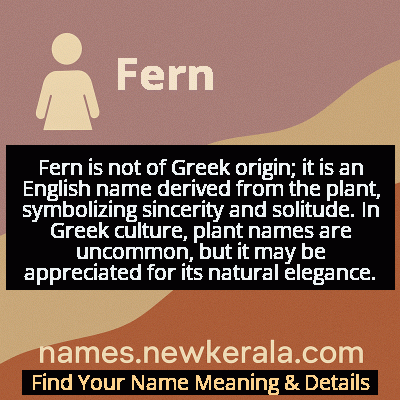Fern Name Meaning & Details
Origin, Popularity, Numerology Analysis & Name Meaning of Fern
Discover the origin, meaning, and cultural significance of the name FERN. Delve into its historical roots and explore the lasting impact it has had on communities and traditions.
Name
Fern
Gender
Female
Origin
Greek
Lucky Number
7
Meaning of the Name - Fern
Fern is not of Greek origin; it is an English name derived from the plant, symbolizing sincerity and solitude. In Greek culture, plant names are uncommon, but it may be appreciated for its natural elegance.
Fern - Complete Numerology Analysis
Your Numerology Number
Based on Pythagorean Numerology System
Ruling Planet
Neptune (Ketu)
Positive Nature
Intuitive, analytical, spiritual, and inquisitive.
Negative Traits
Secretive, reserved, aloof, and can be overly critical.
Lucky Colours
Green, yellow.
Lucky Days
Monday.
Lucky Stones
Cat’s eye, moonstone.
Harmony Numbers
1, 5, 6.
Best Suited Professions
Scientists, researchers, spiritual leaders, detectives.
What People Like About You
Depth of knowledge, analytical skills, spirituality.
Famous People Named Fern
Fern Britton
Television presenter
Hosted popular British TV shows including 'This Morning' and 'Ready Steady Cook'
Fern Mallis
Fashion executive
Created New York Fashion Week and served as executive director of CFDA
Fern Kinney
Singer
American R&B singer known for hit single 'Together We Are Beautiful'
Fern Persons
Actress
American actress with career spanning over 70 years, appearing in films like 'Road to Perdition'
Name Variations & International Equivalents
Click on blue names to explore their detailed meanings. Gray names with will be available soon.
Cultural & Historical Significance
Extended Personality Analysis
Individuals named Fern are often perceived as having a gentle yet resilient nature, much like the plant itself. They typically exhibit qualities of adaptability and quiet strength, able to thrive in various environments while maintaining their core identity. Ferns are frequently described as intuitive and observant, with a deep connection to nature and an appreciation for subtle beauty. Their calm demeanor often masks an inner wisdom and persistence that enables them to overcome challenges with grace. Many Ferns display creative tendencies and artistic sensibilities, drawn to activities that allow self-expression and connection with the natural world. They tend to be loyal friends and compassionate listeners, offering stable support to those in their circle. The duality of their nature - both delicate and hardy - makes them complex individuals who can navigate both gentle and challenging circumstances with equal poise. This combination of sensitivity and strength often makes Ferns particularly effective in caregiving roles, creative professions, and environmental advocacy.
Modern Usage & Popularity
In contemporary naming practices, Fern has experienced a notable resurgence as part of the vintage botanical name revival trend. After declining in popularity throughout the 20th century, the name began regaining traction in the early 2000s, particularly among parents seeking nature-inspired names with classic charm. Current usage data shows Fern ranking within the top 500 names for girls in several English-speaking countries, with particularly strong popularity in the United Kingdom and Australia. The name appeals to modern parents for its eco-friendly connotations, literary connections (notably from Charlotte's Web), and soft, gentle sound. Social media and celebrity influences have contributed to its renewed popularity, with several high-profile figures choosing botanical names for their children. Fern fits well with current naming trends that favor short, vintage names with natural meanings, making it a stylish choice that bridges traditional and contemporary naming sensibilities while appealing to environmentally conscious families.
Symbolic & Spiritual Meanings
Symbolically, Fern represents multiple layers of meaning that transcend its simple botanical origins. As a plant that dates back to prehistoric times, it symbolizes ancient wisdom, endurance, and connection to earth's primordial energy. The fern's ability to grow in shady, challenging conditions makes it an emblem of resilience and adaptability. In many cultures, ferns represent sincerity, confidence, and shelter - their unfurling fronds symbolize new beginnings and personal growth. The feather association adds dimensions of lightness, spiritual elevation, and communication with higher realms. In Japanese culture, the fern pattern (shippō) represents interconnectedness and eternal harmony. The plant's reproductive cycle through spores rather than seeds lends it symbolism of magic, mystery, and hidden potential. Together, these symbolic associations create a rich tapestry of meanings that position Fern as a name representing natural wisdom, quiet strength, spiritual connection, and the beauty of unfolding possibilities - making it a deeply meaningful choice that resonates across spiritual, ecological, and personal dimensions.

